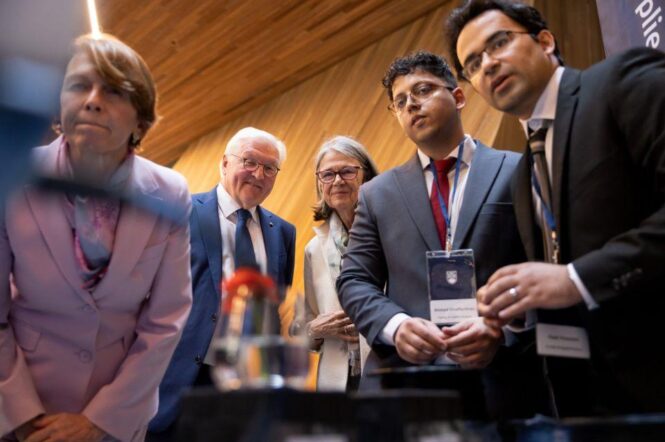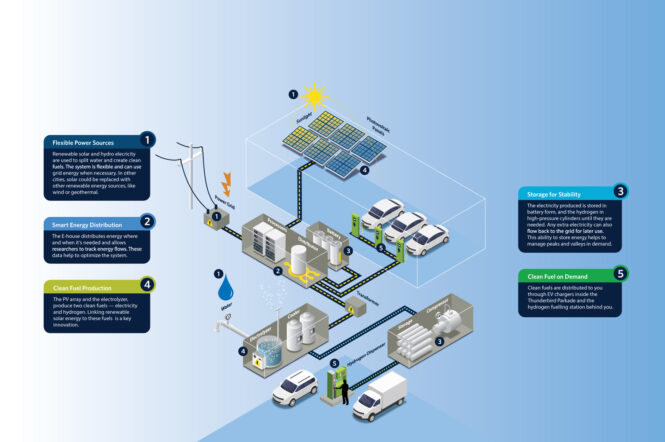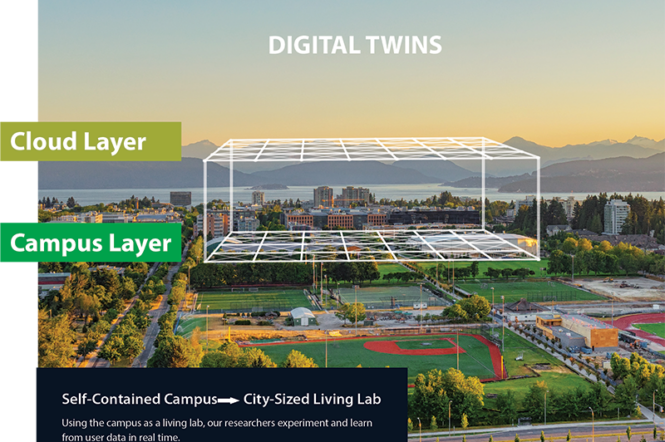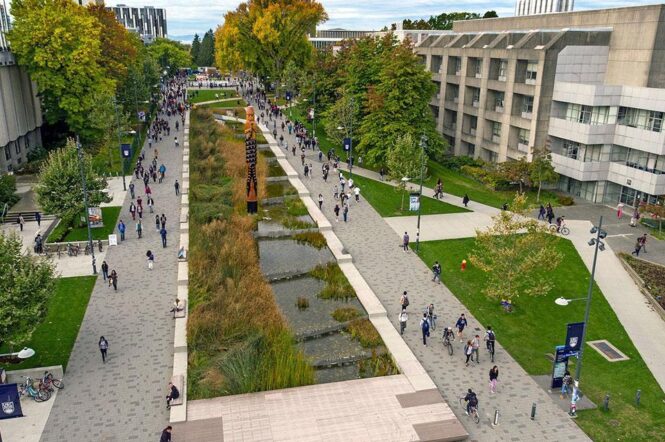Initiatives
Mobilizing research to accelerate solutions for today and the future.
Featured

German President’s visit to UBC highlights clean energy and climate change solutions
The University of British Columbia today hosted Frank-Walter Steinmeier, the President of Germany, as part of his first official visit to Canada.
$83.6M to Accelerate Community Energy Transformation
The University of Victoria will lead a national, multi-partner research initiative that will help get Canada to net zero—one community at a time—with thanks to an $83.6-million investment from the Canada First Research Excellence Fund (CFREF). Accelerating Community Energy Transformation (ACET) is a collaborative initiative that brings together over 40 partners, including Indigenous knowledge keepers and community leaders,…
Latest
-

German President’s visit to UBC highlights clean energy and climate change solutions
The University of British Columbia today hosted Frank-Walter Steinmeier, the President of Germany, as part of his first official visit to Canada. -

$83.6M to Accelerate Community Energy Transformation
The University of Victoria will lead a national, multi-partner research initiative that will help get Canada to net zero—one community at a time—with thanks to an $83.6-million investment from the Canada First Research Excellence Fund (CFREF). Accelerating Community Energy Transformation (ACET) is a collaborative initiative that brings together over 40 partners, including Indigenous knowledge keepers and community leaders,… -

Decarbonizing public transit fleets with TransLink, BC Hydro and Vancouver Economic Commission
he NSERC grant to MéridaLabs at UBC will support a project to develop datasets and sophisticated models to inform emissions reduction strategies as new propulsion technologies are deployed in public transit fleets. Multidisciplinary teams will develop Digital Twins – virtual clones that provide real-time monitoring, predictive analysis, and optimization – for UBC’s Smart Hydrogen Energy District (a $24M research platform on the Vancouver campus) that are linked to integrated simulation platforms for transportation routes, processes, operations, and energy requirements. -

Research Excellence Clusters led by UBC Applied Science receive GCRC funding
Seven Research Excellence Clusters led by UBC Faculty of Applied Science members will receive funding through UBC’s 2023/24 Grants for Catalyzing Research Clusters (GCRC) competition. The GCRC enables the formation and growth of interdisciplinary research excellence clusters – networks of researchers from multiple disciplines working to address key societal problems – and to help these clusters produce… -

New UBC water treatment zaps ‘forever chemicals’ for good
Forever chemicals, formally known as PFAS (per-and polyfluoroalkyl substances) are a large group of substances that make certain products non-stick or stain-resistant. There are more than 4,700 PFAS in use, mostly in raingear, non-stick cookware, stain repellents and firefighting foam. Research links these chemicals to a wide range of health problems including hormonal disruption, cardiovascular disease, developmental delays and cancer. -

UBC Applied Science and Teck announce $4M for mine tailings research and education
UBC Applied Science and Teck Resources Limited today announced a $4 million investment into a new professorship focused on enhancing safety and sustainability in mine tailings management. Teck’s $2 million endowment will be matched by UBC to fund a new professor and lab-based research focused on tailings management at undergraduate and graduate levels. -

Researchers test smart surfaces to improve wireless communication and localization
Researchers at UBC Okanagan are looking at ways to improve cell phone connectivity and localization abilities by examining “smart” surfaces that can bounce signals from a tower to customers to improve the link. A smart surface involves installing reflective elements on windows or panels on buildings in dense urban environments. -

Finding new life for plastic waste
From bottles and straws, toys and tupperware to medical stents, eyewear and even tea bags, plastic is everywhere in our society. Although the meteoric rise of plastic was the result of its economy and ease of production, the question now is, what do we do with the estimated 380 million tonnes of plastic waste produced globally each year? -

CIHR funds UBC Applied Science research on climate resilience, more effective vaccines
Nine projects led or co-led by UBC Applied Science-affiliated researchers are being awarded more than $3.6 million through the Canadian Institutes of Health Research (CIHR) Project Grants: Fall 2022 competition. -

Interdisciplinary health research involving UBC Applied Science awarded $225,000
Nine interdisciplinary research projects involving UBC Applied Science faculty are each receiving up to $25,000 in Health Innovation Funding Investment (HIFI) Awards from UBC Health. HIFI Awards enable interdisciplinary groups of health researchers to undertake innovative activities with the potential to create change, catalyzing cross-faculty and cross-campus collaborations across UBC Vancouver and Okanagan. A new health equity… -

Reframing masculinity: Connecting men to mental health supports that work
This article was originally published on the Canadian Institutes of Health Research website. It has been called a silent epidemic. Men who are suffering from depression get diagnosed at half the rate of women, yet they are three to four times more likely to die by suicide. Globally, men account for 69% of all suicides –… -

Celebrating diversity and fostering inclusion to improve the health of 2SLGBTQ+ youth
Fostering supportive environments for 2SLGBTQ+ youth is crucial because, as Dr. Saewyc explained, having a strong social support network – including family members, friends, classmates, and schoolteachers – is a key factor contributing to youths' health and wellbeing. In fact, it has been shown that when youth feel they have strong family support and school connectedness, they are more likely to have good mental health and less likely to engage in substance abuse.











